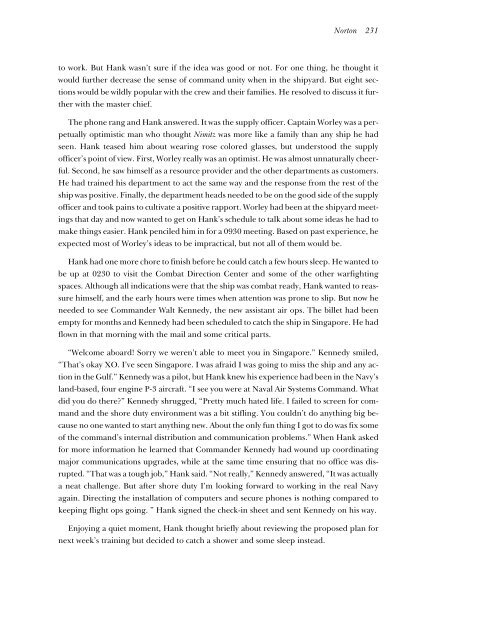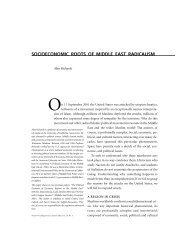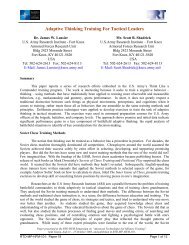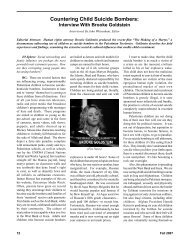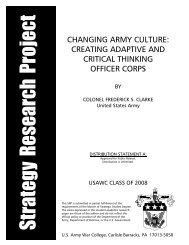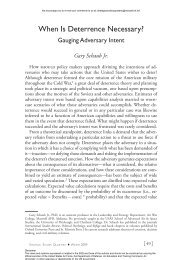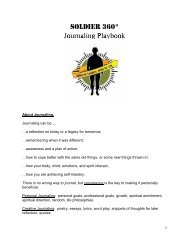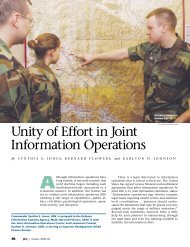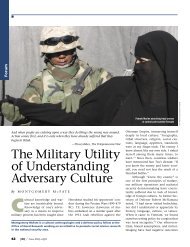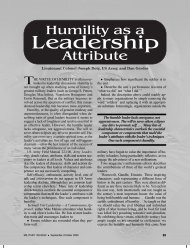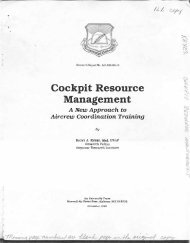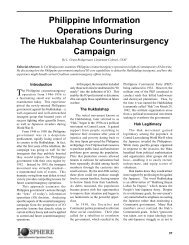Forward...to the Shipyard: The Case of the USS Nimitz
Forward...to the Shipyard: The Case of the USS Nimitz
Forward...to the Shipyard: The Case of the USS Nimitz
Create successful ePaper yourself
Turn your PDF publications into a flip-book with our unique Google optimized e-Paper software.
Nor<strong>to</strong>n 231<br />
<strong>to</strong> work. But Hank wasn’t sure if <strong>the</strong> idea was good or not. For one thing, he thought it<br />
would fur<strong>the</strong>r decrease <strong>the</strong> sense <strong>of</strong> command unity when in <strong>the</strong> shipyard. But eight sections<br />
would be wildly popular with <strong>the</strong> crew and <strong>the</strong>ir families. He resolved <strong>to</strong> discuss it fur<strong>the</strong>r<br />
with <strong>the</strong> master chief.<br />
<strong>The</strong> phone rang and Hank answered. It was <strong>the</strong> supply <strong>of</strong>ficer. Captain Worley was a perpetually<br />
optimistic man who thought <strong>Nimitz</strong> was more like a family than any ship he had<br />
seen. Hank teased him about wearing rose colored glasses, but unders<strong>to</strong>od <strong>the</strong> supply<br />
<strong>of</strong>ficer’s point <strong>of</strong> view. First, Worley really was an optimist. He was almost unnaturally cheerful.<br />
Second, he saw himself as a resource provider and <strong>the</strong> o<strong>the</strong>r departments as cus<strong>to</strong>mers.<br />
He had trained his department <strong>to</strong> act <strong>the</strong> same way and <strong>the</strong> response from <strong>the</strong> rest <strong>of</strong> <strong>the</strong><br />
ship was positive. Finally, <strong>the</strong> department heads needed <strong>to</strong> be on <strong>the</strong> good side <strong>of</strong> <strong>the</strong> supply<br />
<strong>of</strong>ficer and <strong>to</strong>ok pains <strong>to</strong> cultivate a positive rapport. Worley had been at <strong>the</strong> shipyard meetings<br />
that day and now wanted <strong>to</strong> get on Hank’s schedule <strong>to</strong> talk about some ideas he had <strong>to</strong><br />
make things easier. Hank penciled him in for a 0930 meeting. Based on past experience, he<br />
expected most <strong>of</strong> Worley’s ideas <strong>to</strong> be impractical, but not all <strong>of</strong> <strong>the</strong>m would be.<br />
Hank had one more chore <strong>to</strong> finish before he could catch a few hours sleep. He wanted <strong>to</strong><br />
be up at 0230 <strong>to</strong> visit <strong>the</strong> Combat Direction Center and some <strong>of</strong> <strong>the</strong> o<strong>the</strong>r warfighting<br />
spaces. Although all indications were that <strong>the</strong> ship was combat ready, Hank wanted <strong>to</strong> reassure<br />
himself, and <strong>the</strong> early hours were times when attention was prone <strong>to</strong> slip. But now he<br />
needed <strong>to</strong> see Commander Walt Kennedy, <strong>the</strong> new assistant air ops. <strong>The</strong> billet had been<br />
empty for months and Kennedy had been scheduled <strong>to</strong> catch <strong>the</strong> ship in Singapore. He had<br />
flown in that morning with <strong>the</strong> mail and some critical parts.<br />
“Welcome aboard! Sorry we weren’t able <strong>to</strong> meet you in Singapore.” Kennedy smiled,<br />
“That’s okay XO. I’ve seen Singapore. I was afraid I was going <strong>to</strong> miss <strong>the</strong> ship and any action<br />
in <strong>the</strong> Gulf.” Kennedy was a pilot, but Hank knew his experience had been in <strong>the</strong> Navy’s<br />
land-based, four engine P-3 aircraft. “I see you were at Naval Air Systems Command. What<br />
did you do <strong>the</strong>re?” Kennedy shrugged, “Pretty much hated life. I failed <strong>to</strong> screen for command<br />
and <strong>the</strong> shore duty environment was a bit stifling. You couldn’t do anything big because<br />
no one wanted <strong>to</strong> start anything new. About <strong>the</strong> only fun thing I got <strong>to</strong> do was fix some<br />
<strong>of</strong> <strong>the</strong> command’s internal distribution and communication problems.” When Hank asked<br />
for more information he learned that Commander Kennedy had wound up coordinating<br />
major communications upgrades, while at <strong>the</strong> same time ensuring that no <strong>of</strong>fice was disrupted.<br />
“That was a <strong>to</strong>ugh job,” Hank said. “Not really,” Kennedy answered, “It was actually<br />
a neat challenge. But after shore duty I’m looking forward <strong>to</strong> working in <strong>the</strong> real Navy<br />
again. Directing <strong>the</strong> installation <strong>of</strong> computers and secure phones is nothing compared <strong>to</strong><br />
keeping flight ops going. ” Hank signed <strong>the</strong> check-in sheet and sent Kennedy on his way.<br />
Enjoying a quiet moment, Hank thought briefly about reviewing <strong>the</strong> proposed plan for<br />
next week’s training but decided <strong>to</strong> catch a shower and some sleep instead.


